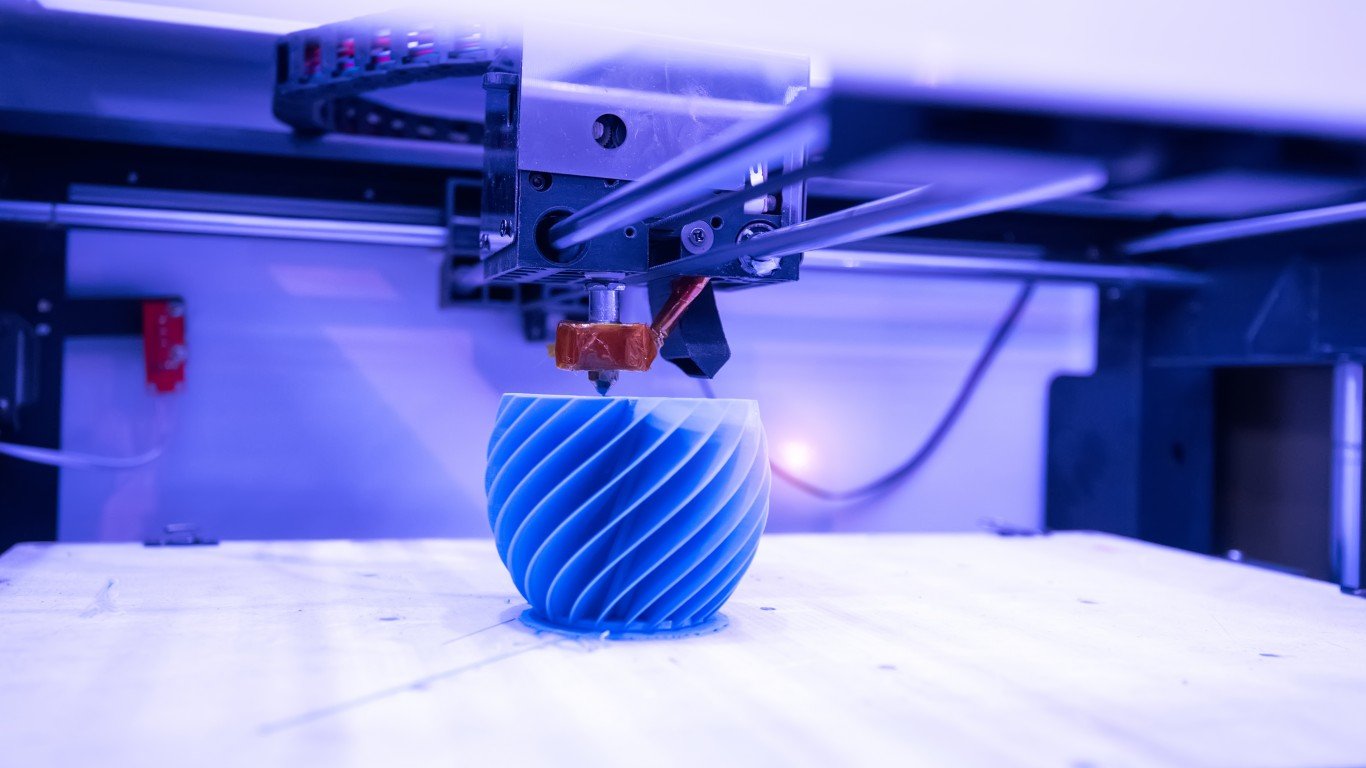

It is human nature to ponder what life will be like in the future, and past predictions have at times turned out to be uncannily prescient. Of course, others, in retrospect, were laughably outlandish.
But when you ponder what life would be like 20 years into the future, current technologies offer reliable signals as to what the next big thing will be. We know, for example, that electronic components are getting smaller, while processors are getting more powerful (and less costly), opening up seemingly endless possibilities in how electronics can be applied to our day-to-day lives. Autonomous vehicles are currently being rolled out, so it’s relatively easy to envision how that tech will play out over the next decade or two. Several global automakers are among these 20 companies leading the AI revolution.
24/7 Wall St. researched reports on future technologies and selected the 16 that seemed most likely to become commonplace within the next decade or two, and ones that are most likely to have the biggest impact on people’s daily lives. We only included technologies that exist in nascent form today because those are the ones most likely to rapidly evolve and scale across society. This list is in alphanumeric order.
Our lives have changed rapidly over the past 20 years. In 2000, the internet was just taking off, social media didn’t exist, and the first smartphones were too expensive to be as ubiquitous as they are now. Today, half the world has access to the internet, billions of people own smartphones, and social media has the power to alter elections.
A lot of the technology that will be part of daily life 20 years from now is already here. If past technological evolution is any indicator, then some of the technologies that are nascent, expensive, and unusual today will become commonplace tomorrow. We might not realistically have any idea of what life will be life in 2119 and beyond, but we have a good idea of how technology will impact our lives by 2039 or sooner. While we don’t know for sure yet, some of this already-present tech will likely shape up to be among the most important inventions of the 21st century.
Click here to see the 16 technologies that will change the way we live

1. 3-D printing
The ability to fabricate materials by “printing” them layer by layer is still largely problematic. Compared to injection molding, 3-D printing holds significant promise once the evolution of the process overcomes the current challenges. 3-D printing has already been used to make sculptures, auto parts, and prototype bridges and homes, and may in the near future be used to construct satellite solar arrays in orbit. 3-D printing will likely proliferate in laboratories, factories, and maybe even in the home.
[in-text-ad]

2. Augmented reality
Enhancing the real world with layers of computer-generated sensory information has been around for a while, most notably in mobile gaming where users interact with virtual graphics displayed over the camera view of a smartphone or tablet screen. AR will soon be more commonly used in other industries, like retail, health care, and live events. Examples include being able to view product information by simply pointing your smartphone camera at a certain item, virtually exploring a home that’s on the market, or letting doctors view relevant medical information though an AR screen pointed at a patient.

3. Autonomous vehicles
Self-driving cars have been rapidly evolving in recent years as the technology that underpins them is rapidly evolving. But tomorrow’s autonomous vehicles will likely look nothing like today’s “self-driving” Tesla and Waymo prototypes. Within our lifetime, we could witness a mass deployment of cars, trucks, planes, and sea vessels operating at so-called Level 4 “High Automation” or Level 5 “Full Automation.” Level 4 automation allows vehicles to operate independently in certain conditions or areas, while Level 5 automation means that the autonomous vehicle can handle any situation a human driver could.

4. Brain-computer interface
Despite being crude and erratic today, the technology that allows devices to be controlled by brain signals is rapidly evolving, and it holds immense promise not just in helping patients with movement, speech, or visual impairments, but also in the workplace. The brain-computer interface, or BCI, could be used to monitor attention in long distance drivers and pilots or to send simple commands to industrial or domestic robots and other devices.
[in-text-ad-2]

5. Cellular agriculture
The process of taking cells from cows and tuna and growing them into hamburger patties and filets would have sounded like something out of a science fiction book 20 years ago, but sometime in the near future â possibly as soon as the end of this year â lab-grown meat will start appearing on store shelves. This is just the beginning of what, in the near future, could be widely available meat, eggs, gelatin, leather, silk, and other currently animal-derived products made through tissue engineering or a fermentation process that uses microorganisms to get proteins currently found in birds, mammals, and fish.

6. CRISPR gene editing
Named after an enzyme that works like a pair of scissors that can cut out DNA strands, CRISPR is a genome-editing tool that can be used for many purposes, including curing genetic disorders, curbing the spread of insect-borne diseases like malaria, and improving agricultural crop yields. CRISPR also raises a bevy of ethical concerns around modifying human embryos. How far we’re willing to go with gene-edited babies has become a major topic of debate.
[in-text-ad]

7. Delivery drones
In 2013, Amazon CEO Jeff Bezos revealed details of his company’s efforts to deploy package delivery drones, and earlier this year, Amazon detailed its newest delivery drone aimed at further reducing delivery times and dependence on human workers. Google and DHL are also exploring their drone-delivery options. The technological hurdles of drone delivery are resolved, but one big challenge is human nature. Until these companies can figure out a way to dissuade people from taking pot-shots at their autonomous vehicles (especially during takeoffs and landings), delivery drone deployment will be limited to certain areas and applications. Air traffic and privacy concerns may also impact their roll out.

8. Gesture-based computing
The use of hand gestures to control computers captured the public’s attention in the 2002 film “Minority Report,” and since then some real-world applications have emerged, most notably in video gaming, smartphones, tablets. In the near future, gesture-based computing will be common for surgical procedures, wearable electronics, and some vehicle controls.

9. Home automation
We’re already seeing the early hints of domotics â a portmanteau of “domus,” the Latin word for home, and “robotics.” Today, you can buy all kinds of connected “smart” home accessories, including thermostats that learn to adjust temperatures based on your habits and refrigerators that automatically build shopping lists. But all of these devices work independently of one another. Future smart homes will have electronics “brains” that will bring all of these smart home gadgets together under a central command, allowing them to communicate with each other.
[in-text-ad-2]

10. LiFi
A decent local WiFi connection works fine, but who wouldn’t want a connection that’s 100 times faster? This is where LiFi comes in. Unlike WiFi (or “wireless fidelity”) that uses radio frequencies, LiFi (or “light fidelity”) uses LED light sources to transmit data at up to 224 Gbps (gigbits per second), compared to the 1 Gbps of a fast WiFi connection. With LiFi, LED light bulbs can act as wireless hubs. There are drawbacks â mainly that you need a light source for the connection to work â but LiFi could become a high-octane supplement to WiFi in future homes, offices, or lab networks.

11. Microchip implants
In 2017, employees of a Wisconsin-based technology company were given the choice to have a microchip the size of a grain of rice injected between their thumb and index finger that would allow them to enter the building and pay for lunch with a wave of a hand. This might sound creepy, but implanted microchip technology had already debuted in Sweden, and the technology holds promise in the field of health care. Despite its nefarious potential, like being able to track people’s movements, these implants can also be used in patients with chronic heart conditions or to monitor glucose among diabetics.
[in-text-ad]

12. Robotic exoskeletons
Today, exoskeletons are commonly known as a rehabilitative tool that helps paraplegics walk with the use of powered robotics attached to their bodies. But they’re also being used or tested by factory workers and soldiers to ease physical strain. While the most likely deployment of exoskeletons will continue to be in industry and health care, companies are working to develop the technology as a consumer-facing product for everyday heavy-lifting or walking-assistance needs.

13. Smart traffic systems
Combining rapid wireless communication and artificial intelligence to analyse massive amounts of data could one day make traffic jams rare if not obsolete. The system uses cameras to monitor traffic flow and relay the data in real time to adjust traffic lights to optimize the flow of motor vehicles and pedestrians. These systems would become more accurate and effective as more vehicles become connected, especially with new technology that would link cars to connected infrastructure, like street lights or traffic relay signs on highways.

14. Universal translators
One of the most intriguing applications of artificial intelligence, machine learning, and high processing power could help resolve one of humanity’s most enduring challenges: language barriers. Technologies like speech recognition and speech-to-text transcription have made momentous progress in recent years. Today’s portable translators are far from perfect. But the Tower of Babel dilemma may soon be resolved as portable, low-cost technology would evolve and be able to recognize and translate speech accurately and in real time.
[in-text-ad-2]

15. V2V (vehicle-to-vehicle) technology
The automatic wireless exchange of information, like speed and position, between vehicles has been cited by U.S. auto safety regulators as an important development for reducing collisions. Giving cars this ability to “talk” to each other is one of the primary innovations in the rapidly evolving automotive industry and will be important in both self-driving and human-controlled vehicles. The vehicle-to-vehicle technology will likely be standard in all new cars in the near future.

16. Zero-size intelligence
Intel co-founder Gordon Moore famously predicted in the 1960s that the number of transistors that could be crammed into the same space of a microchip would double about every two years. In recent years companies have produced small chips packed with billions of transistors, the building blocks of processing power. In computing lingo, zero-size intelligence means that the space a processor takes up is so miniscule that it allows immersive computing power to be packaged into virtually anything, which could advance everything from space exploration to processing massive amounts of data.
Take This Retirement Quiz To Get Matched With An Advisor Now (Sponsored)
Are you ready for retirement? Planning for retirement can be overwhelming, that’s why it could be a good idea to speak to a fiduciary financial advisor about your goals today.
Start by taking this retirement quiz right here from SmartAsset that will match you with up to 3 financial advisors that serve your area and beyond in 5 minutes. Smart Asset is now matching over 50,000 people a month.
Click here now to get started.
Thank you for reading! Have some feedback for us?
Contact the 24/7 Wall St. editorial team.
 24/7 Wall St.
24/7 Wall St. 24/7 Wall St.
24/7 Wall St.
